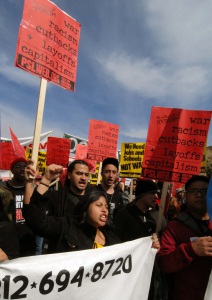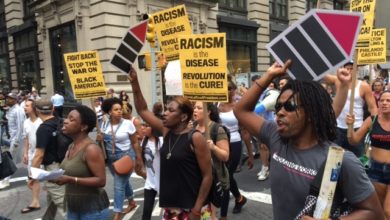 Originally published in the December issue of Liberation Newspaper.
Originally published in the December issue of Liberation Newspaper.
In 2015, “socialism” was the most searched word on the Merriam-Webster online dictionary.
The first Democratic Party debate, watched by 15 million people, began with a question to candidate Bernie Sanders about his identification as a democratic socialist.
“Socialism” and “capitalism” were also the most looked up words for the whole year of 2012, when the Republican Party focused its campaign on falsely accusing President Obama of being a socialist.
Clearly, a large section of the population has an openness to learn about socialism. In addition to that general sentiment of curiosity, more and more activists now denounce “the system,” and even name capitalism as an enemy alongside white supremacy and patriarchy.
And why wouldn’t they? The country’s richest 20 capitalists now possess more wealth than the bottom 194 million people!
Sanders’ economic program of raising the minimum wage, launching a new infrastructure-based jobs program, free college education and universal health care—funded by taxing Wall Street—has resonated with large numbers of young and working-class people. For him, these progressive policies make up the core definition of “democratic socialism.”
All these reforms are necessary and justified, but for the Party for Socialism and Liberation, socialism means a revolution in the way society is organized—the way we live.
In a socialist system, corporations would not just be regulated and taxed. Their executives would be stripped of their power as the masters of the economy. The enterprises would be put under public control and run with a plan to meet people’s needs and save the environment.
Freed from the burden of supporting the lavish lifestyles and fortunes of the former ruling class, these mega-profits would be utilized for the overall development of society.
A job, health care, education, housing, and a dignified retirement would be constitutional rights. They would be joined by other rights—union representation, nutritious food, the right to culture and recreation, among others.
The new order would backed up by a new state that would replace the current police forces and court system.
Socialism versus capitalism
In the current system, people can vote for politicians but have no power or even input over the most important things affecting their lives.
Wealth and income determines what kind of housing one lives in, as well as the quality of the food and health care one can access, and all the other necessities of life. Working-class people are forced to compete for a select few spots at quality schools and then decent-paying jobs.
The decision about what is built in one’s community is decided by the owners of the land—typically bankers and developers—who are driven solely by profit. The same is true about how one’s job is run, what gets mass produced, what receives investment and what gets neglected. Those decisions are made in private boardrooms even though they involve all of our lives. This is a dictatorship of Wall Street, disguised as democracy.
Poor and working people do not get to decide whether or not the country goes to war, which is all the time under capitalism, or if a racist cop is held accountable for his crimes.
Liberation
White supremacy has enabled the U.S. ruling class to amass enormous wealth and power. Beginning with the genocide of the Indigenous peoples and the enslavement and murder of tens of millions of Africans, the capitalist system has always been covered in blood. It has employed Jim Crow segregation, KKK terror, mass incarceration, police brutality and discrimination in all aspects of life to super-exploit and beat down nationally oppressed people.
The socialist program would marshal massive resources, including reparations, affirmative action and militant anti-racist cultural campaigns, to reverse the oppressive legacies of capitalism. The racist police forces and judges would be disbanded and made to account for their crimes. To rebuild trust and working-class unity on new foundations, socialists recognize the right to self-determination for oppressed nations.
Patriarchy, the historic oppression of women, predates capitalism, but can be ended under socialism. Women would be guaranteed full social and economic equality, and women’s leadership and contributions would be held up. True reproductive freedom, including abortions as well as free childcare, would be respected.
While bigotry cannot be erased overnight or by decree, breaking down the patriarchal norms and arbitrary rules of gender and sexuality would ease the pressure to conform and allow free expression. In a socialist society, the state would mobilize its resources to intervene in this “war of ideas” and promote LGBTQ equality and liberation.
The amazing creative potential and productivity of humanity are currently being held back by the irrational and unjust structure of capitalist society—in which most people are struggling just to survive. Socialism is the system to liberate that potential, end that unnecessary rat race and reorganize society on entirely new foundations.






